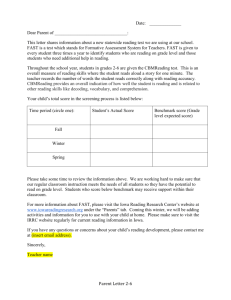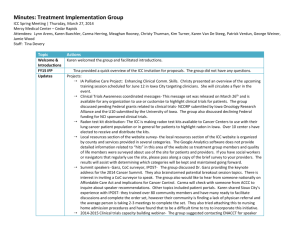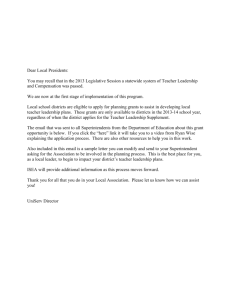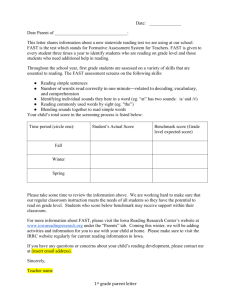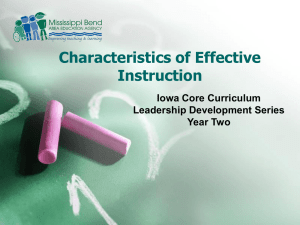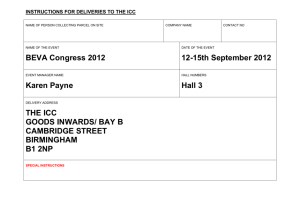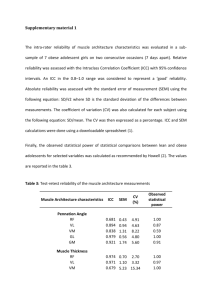Science Action Plan 2009-10
advertisement
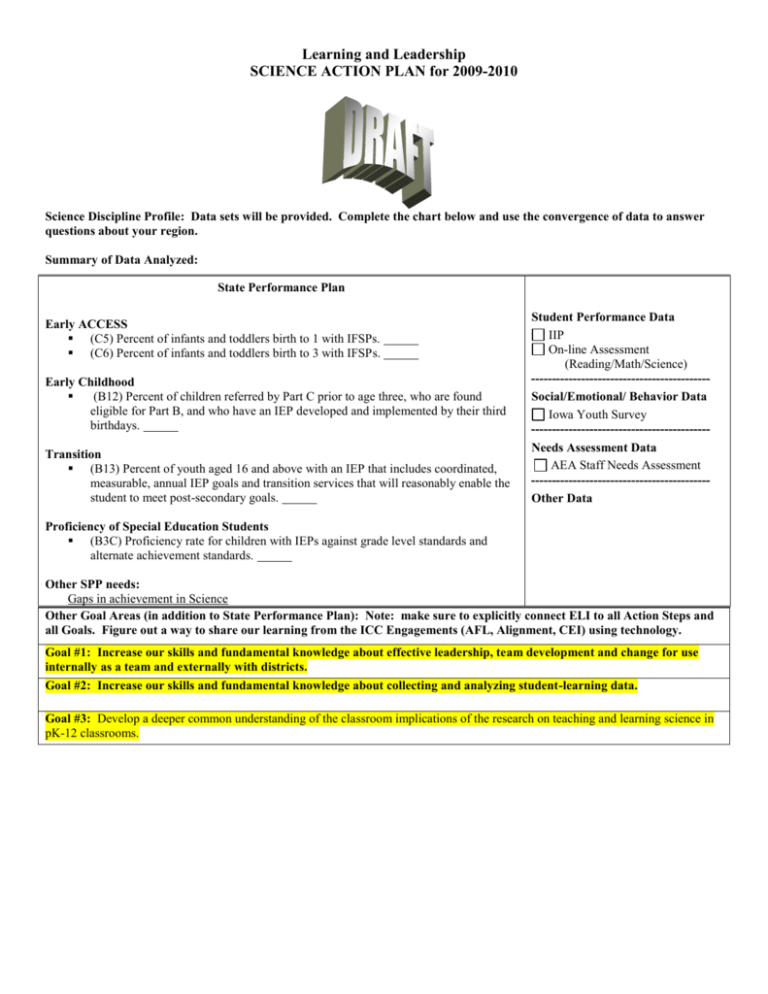
Learning and Leadership SCIENCE ACTION PLAN for 2009-2010 Science Discipline Profile: Data sets will be provided. Complete the chart below and use the convergence of data to answer questions about your region. Summary of Data Analyzed: State Performance Plan Early ACCESS (C5) Percent of infants and toddlers birth to 1 with IFSPs. (C6) Percent of infants and toddlers birth to 3 with IFSPs. Early Childhood (B12) Percent of children referred by Part C prior to age three, who are found eligible for Part B, and who have an IEP developed and implemented by their third birthdays. Transition (B13) Percent of youth aged 16 and above with an IEP that includes coordinated, measurable, annual IEP goals and transition services that will reasonably enable the student to meet post-secondary goals. Student Performance Data IIP On-line Assessment (Reading/Math/Science) ------------------------------------------Social/Emotional/ Behavior Data Iowa Youth Survey ------------------------------------------Needs Assessment Data AEA Staff Needs Assessment ------------------------------------------Other Data Proficiency of Special Education Students (B3C) Proficiency rate for children with IEPs against grade level standards and alternate achievement standards. Other SPP needs: Gaps in achievement in Science Other Goal Areas (in addition to State Performance Plan): Note: make sure to explicitly connect ELI to all Action Steps and all Goals. Figure out a way to share our learning from the ICC Engagements (AFL, Alignment, CEI) using technology. Goal #1: Increase our skills and fundamental knowledge about effective leadership, team development and change for use internally as a team and externally with districts. Goal #2: Increase our skills and fundamental knowledge about collecting and analyzing student-learning data. Goal #3: Develop a deeper common understanding of the classroom implications of the research on teaching and learning science in pK-12 classrooms. Learning and Leadership SCIENCE ACTION PLAN for 2009-2010 Person(s) responsible for implementing and monitoring plan: GWAEA Science Curriculum Consultants Description of the ideal state: Critical element: Vision + Skills + Incentives + Resources + Action Plan = Change Goal #1: Increase our skills and fundamental knowledge about effective leadership, team development and change for use internally as a team and externally with districts. Action Steps to Be Taken Person(s) Resources Timeline Bi-Annual Progress Updates Responsible 1. Attend the Wellman Training on Entire Team Professional Register by All Science Curriculum Professional Learning Communities as a Growth Dollars September Consultants will be in Team to support Attend in attendance. registration. March 2. Learn more about PLC’s to use with our Entire Team Agency By April, 2010 Set a time to Debrief the own team internally and to use with districts support to Wellman training on PLC’s. we serve. attend Purchase any materials that Wellman PLC we can use to implement the Training and to strategies learned with acquire follow districts using Science up study Content Dollars. materials to allow us to continue to apply our learning. 3. Learning leadership development and Entire Team Time to Ongoing Evidence of meeting time change tools to use with working with collaborate, devoted to sharing and district leadership teams. share and practicing these tools. practice An archive of artifacts. applying tools within our team meetings. Time to share what has worked with districts in our team meetings. An archive of PowerPoint’s and Planners in a common repository – Learning and Leadership SCIENCE ACTION PLAN for 2009-2010 4. Support the teacher leaders in the Assessing Science Knowledge cadre. Entire team 5. Knowledge acquisition through book study on Taking Science to School and Ready, Set, Science to better understand the current research in order to effectively support change (reform) initiatives in our districts. Entire Team 6. Personal application of team development and change skills within the team meetings. Each Team Member such as Base Camp Resources to bring teacher leaders together to deepen their learning with the Assessing Science Knowledge materials. TQM to provide time for team to meet beyond work hours to engage in the common book study. Time allocated within team meetings to monitor our personal growth. Fall, 2009 A cadre of teachers successfully piloting the ASK assessment materials. Ongoing support and technical assistance for the science curriculum consultants to be able to provide training for the ASK cadre teacher leaders. Ongoing Each team member has been keeping a professional notebook of their learning’s from these book studies. Calendar of study dates. Successful implementation of a TQM proposal. Ongoing Successful implementation of team development and change skills by each team member. A shift on our Team Development Tool Survey toward a more holonomous group. Goal #3: Develop a deeper common understanding of the classroom implications of the research on teaching and learning science in pK-12 classrooms. Action Steps to Be Taken Person(s) Resources Timeline Bi-Annual Progress Updates Responsible 1. Develop deeper understanding of CTS on Entire team CTS resources Ongoing Successfully apply the CTS lesson design in K-12. ELI process in our inservices with Time to meet teachers throughout our ELI Scale Up and IGISST grant work. 2. Continue developing understanding of Entire team Assessment for Ongoing Successfully implement formative assessment strategies and research Learning formative assessment in addition to committing time to using readings and strategies that work in our ELI summative assessment data through our resources. Scale up professional common learning about ICC Assessment for Common development initiatives. Learning and the Assessing Science learning with Knowledge project. the GWAEA Assessment Consultant, Gregory Dunn. Learning and Leadership SCIENCE ACTION PLAN for 2009-2010 3. Review and reflect on the VAST Curriculum framework and continue the alignment to the ICC. Entire Team ICC VAST Curriculum Time and content budget resources. Ongoing 4. Continue the book study on Ready, Set, Science and Taking Science to School. Entire Team TQM resources Time A Copy of both books for each consultant. Ongoing A document showing the extent of alignment between the ICC and the VAST Framework. A common understanding of the Big Ideas of each of the K8 units within the VAST Framework. Successful implementation of the TQM proposal. Goal #2: Increase our skills and fundamental knowledge about collecting and analyzing student-learning data. Action Steps to Be Taken Person(s) Resources Timeline Bi-Annual Progress Updates Responsible 1. Find ways to collect and analyze student Jeanne, with Time and Ongoing Progress reports from a learning data from schools implementing the support from access to data sample of participating VAST Kits in the Eastern Iowa Science the entire EISC districts. Collaborative. members 2. Implement the FOSS ASK Pilot and Entire Team Time Ongoing Successful implementation of connect to the Iowa Core and ELI. Support from the ASK Pilot. the FOSS ASK Clear documentation of the leadership alignment between the ASK team. Pilot, ICC and ELI. More information about formative assessments from the ICC team. 3. Analysis of student work (formative Entire Team Authentic Ongoing Each team member will assessment data) to inform instruction and student work. become proficient at planning. Analysis analyzing student formative protocol assessment data. Review the research and literature for instructional implications 4. Determine the achievement gaps in Entire Team Assess to and Ongoing A clear picture of the science in order to be able to provide technical achievement of all sub-groups suggestions for closing the gap to teachers. system about of students in GWAEA in the how to mine area of science. the Online Learning and Leadership SCIENCE ACTION PLAN for 2009-2010 Assessment System Data for ITBS/ITED data. Achievement data for subgroups over time in science (longitudinal study from Gregory). District/teacher Feedback from George Held regarding science support. Implications for Agency Professional Development: o Staff will need additional training on AEA Online Assessment System. o Staff will need additional training on Professional Learning Communities (Wellman Training) o Staff will need to continue to attend Statewide Science Initiative (Every Learner Inquires) and State Science Curriculum Consultant meetings – both of which are typically held in the Des Moines area for statewide access. O Staff may need additional time to collaborate in Iowa Core Curriculum Engagement Opportunities (e.g. Assessment for Learning, 21st Century Skills, Effective Classroom Instructional Techniques, Alignment and). O Staff will need time and monetary resources to attend state, regional, and national conferences (such as ISTS, NSTA, ASCD, Next Step, etc…) in order to continue to learn about current research in the area of science education. Implications for LEA Involvement: o Ongoing support and focus on curriculum, instruction and assessment in the area of science. o Continued development of Teacher Leaders. o Scale up of Every Learner Inquires. o Continue district support in the area of STEM from Teacher in Residence position Evidence of Success (How will you know you are making progress? What are your benchmarks?) o Successful implementation of VAST science units. o Successful implementation and analysis of formative and summative assessments. o Completion of commitments in VAST G2 plan. o Accomplish professional growth goals as listed on individual professional growth plans. o Feedback from LEA’s on curriculum, instruction and assessment work in the area of comprehensive school improvement. Evaluation Process (How will you determine that your goal has been reached? What are your measures?): We are working with Janine and Trace and the Professional Development office to measure on all five levels of Guskey’s model for evaluation of effective professional development: o Student Learning Goals = Student achievement in science. o Teacher Practice Goals = effective implementation of inquiry-based instructional strategies (CBAM tools) Learning and Leadership SCIENCE ACTION PLAN for 2009-2010 o o o Teacher Learning (leadership) Goals = knowledge of core science concepts in the areas they teach and pedagogical content knowledge Teacher Satisfaction Goals = PD surveys Organizational or system (leadership) Goals = CBAM tools The following Agency Directed travel needs are proposed for 2009-2010 school year for professional development: o Travel to Cedar Rapids area for ELI training sessions. o Travel to Des Moines area for Statewide Science Curriculum Consultant meetings. o Travel to Iowa Science Teacher Section of the Iowa Academy of Science Fall Conference in the Des Moines area. o Travel to NSTA in Minneapolis, MN. o Travel associated with the IGISST grant. o Travel to state, regional and national meetings to stay current on issues related to science education.
